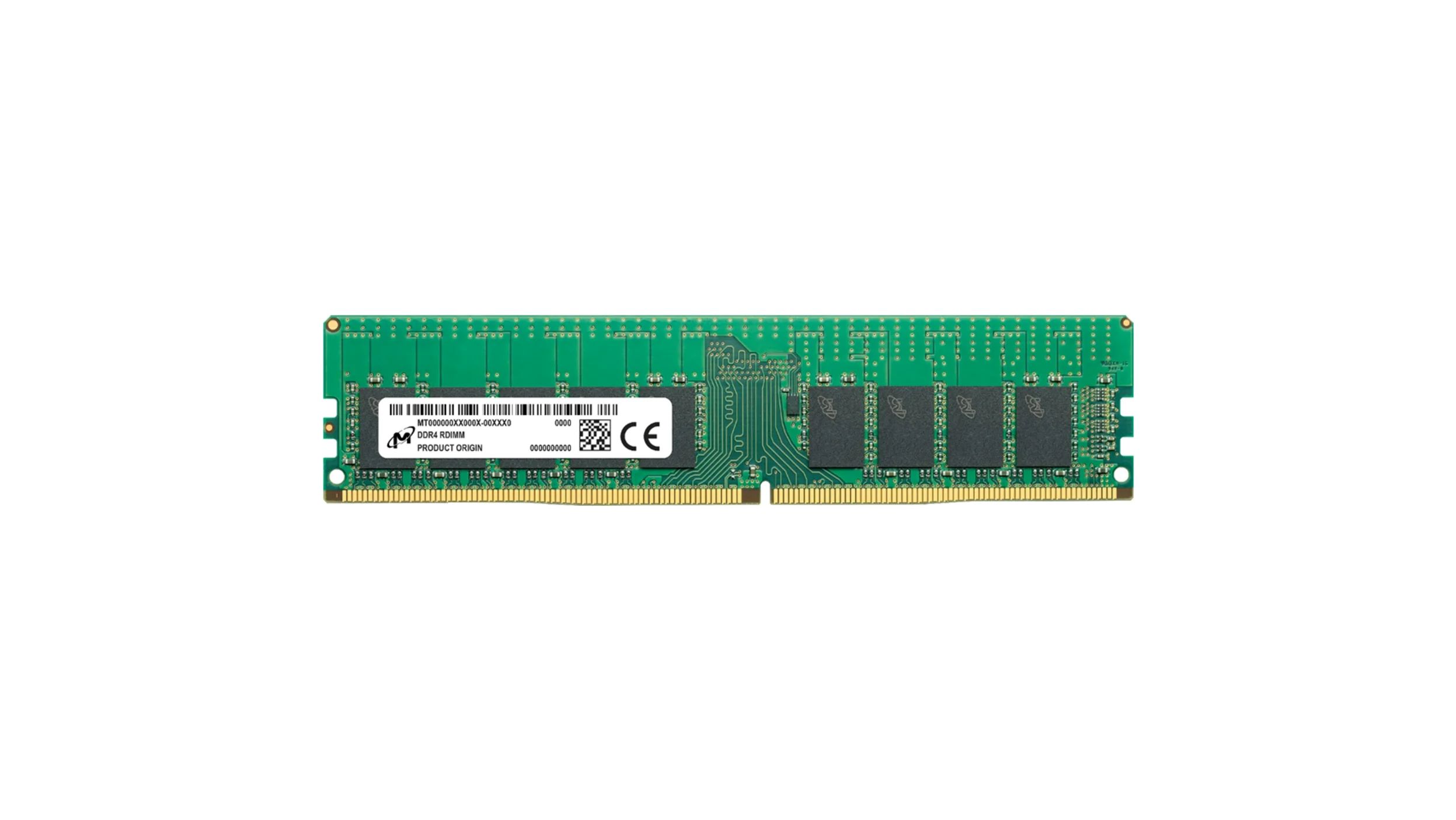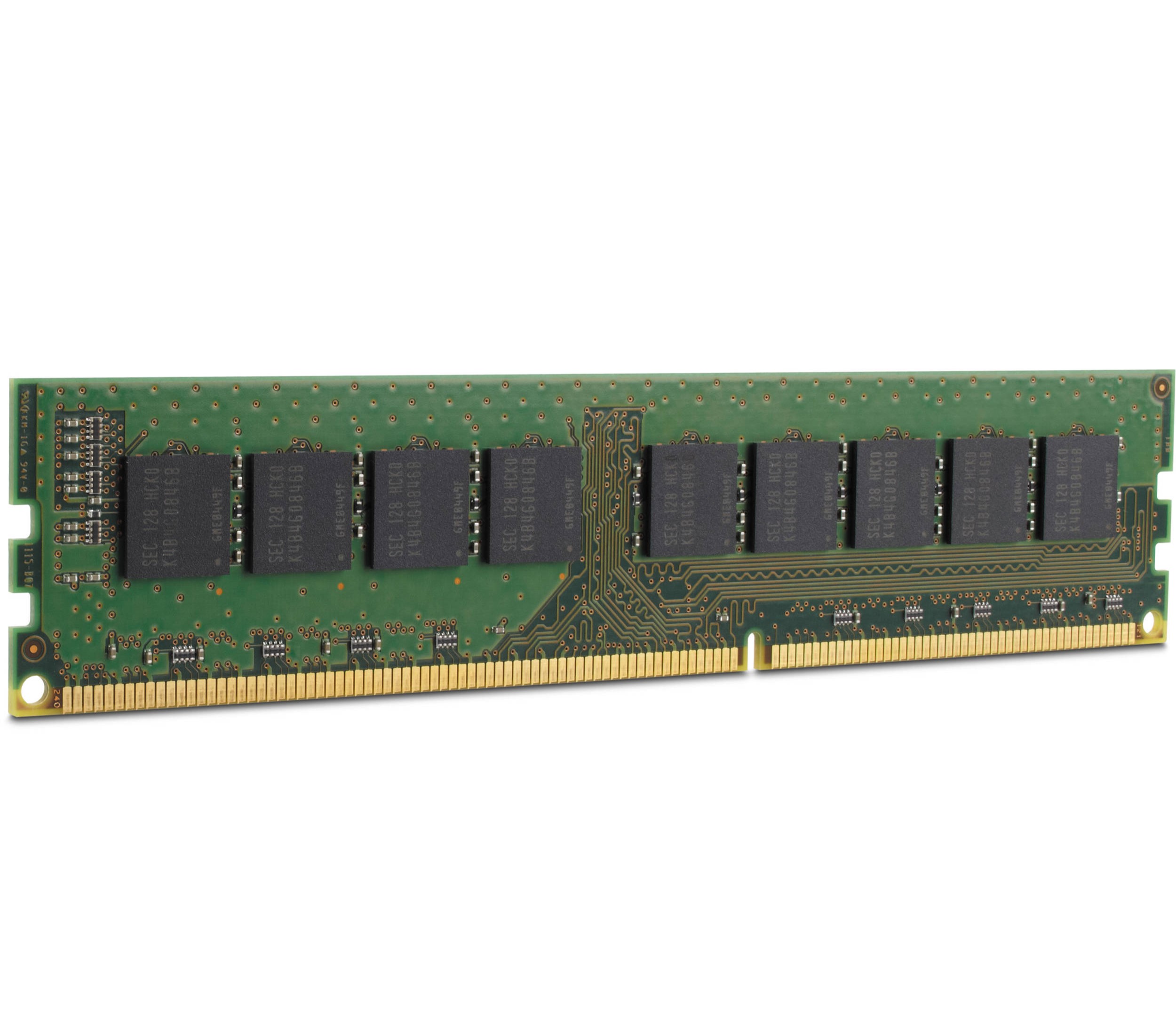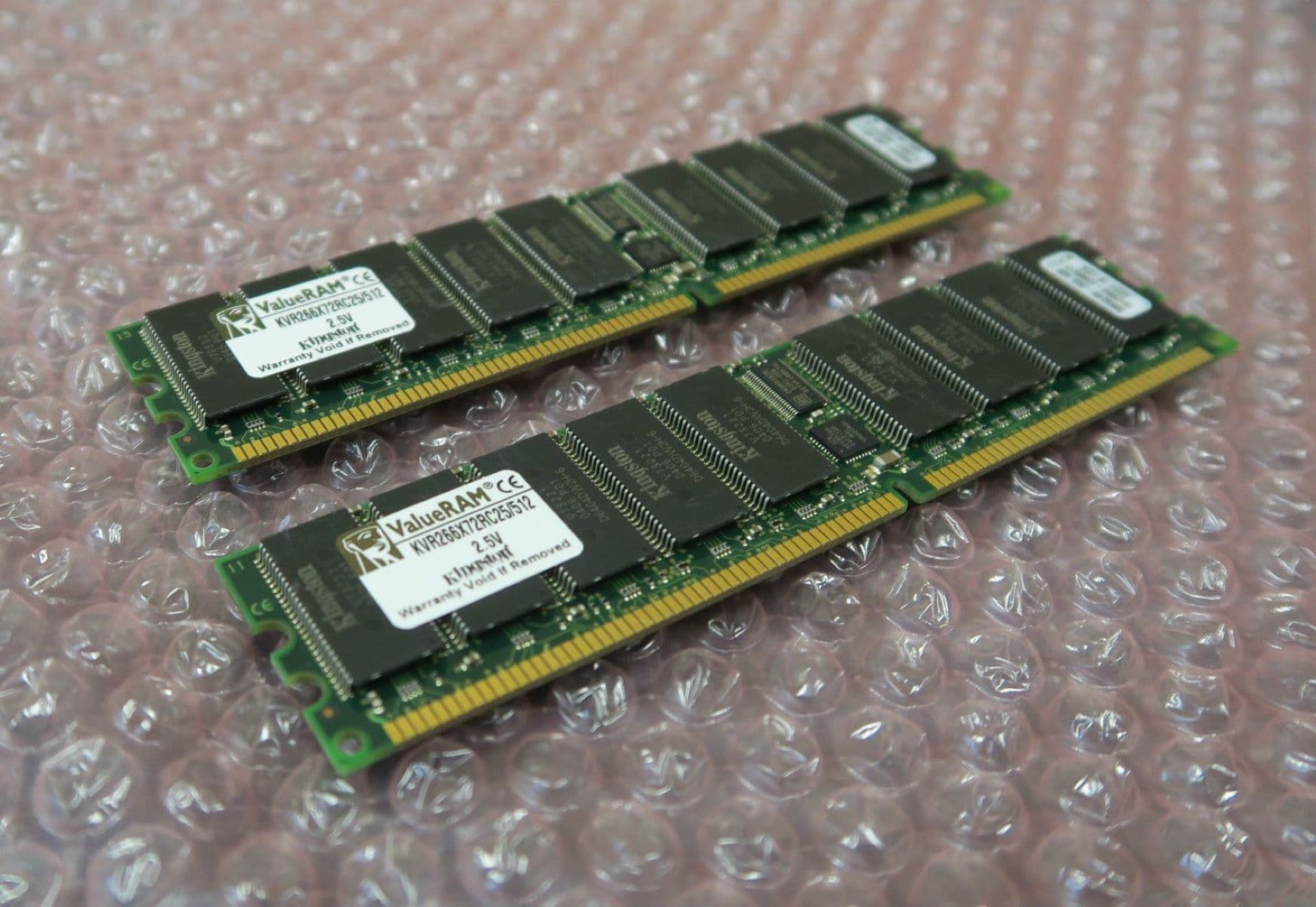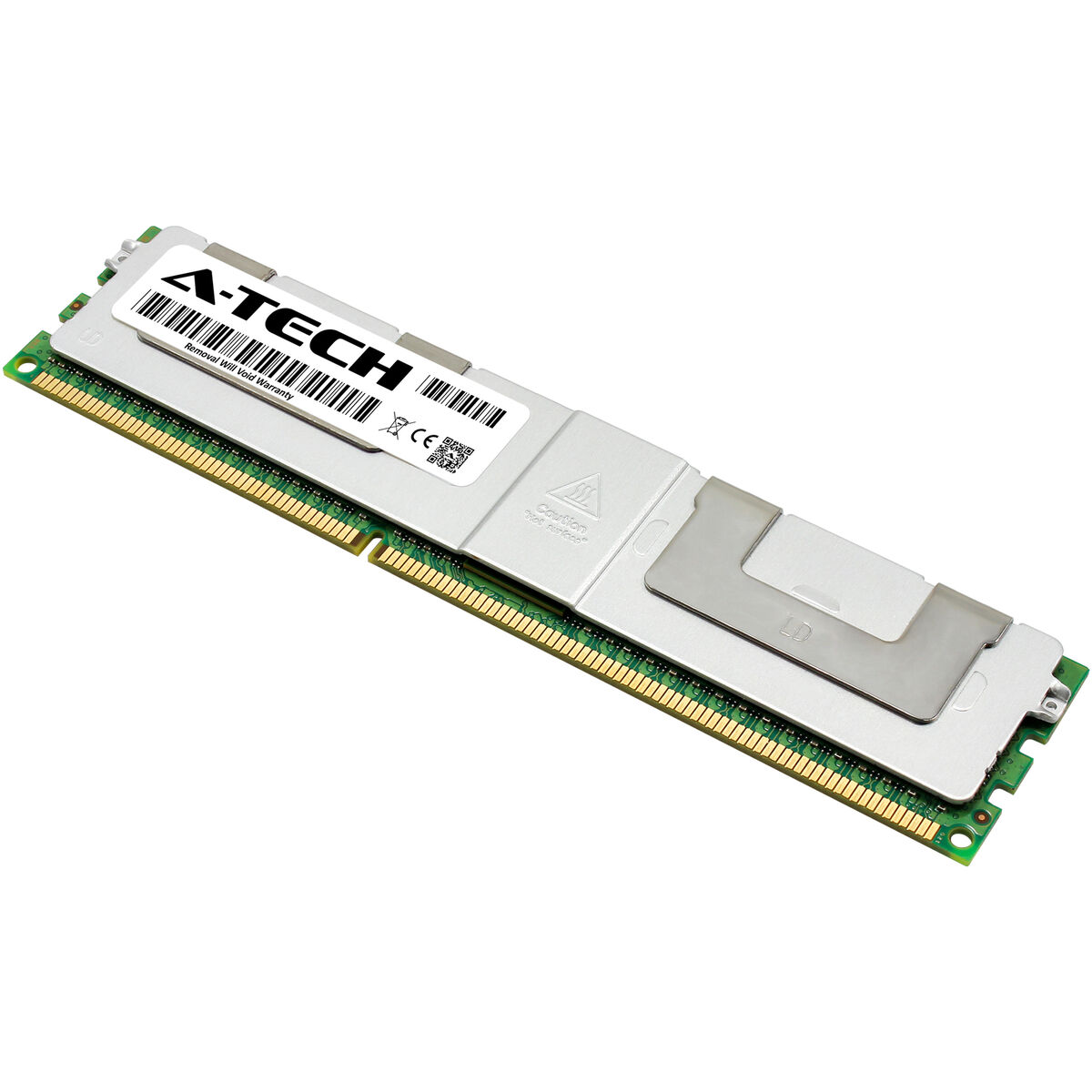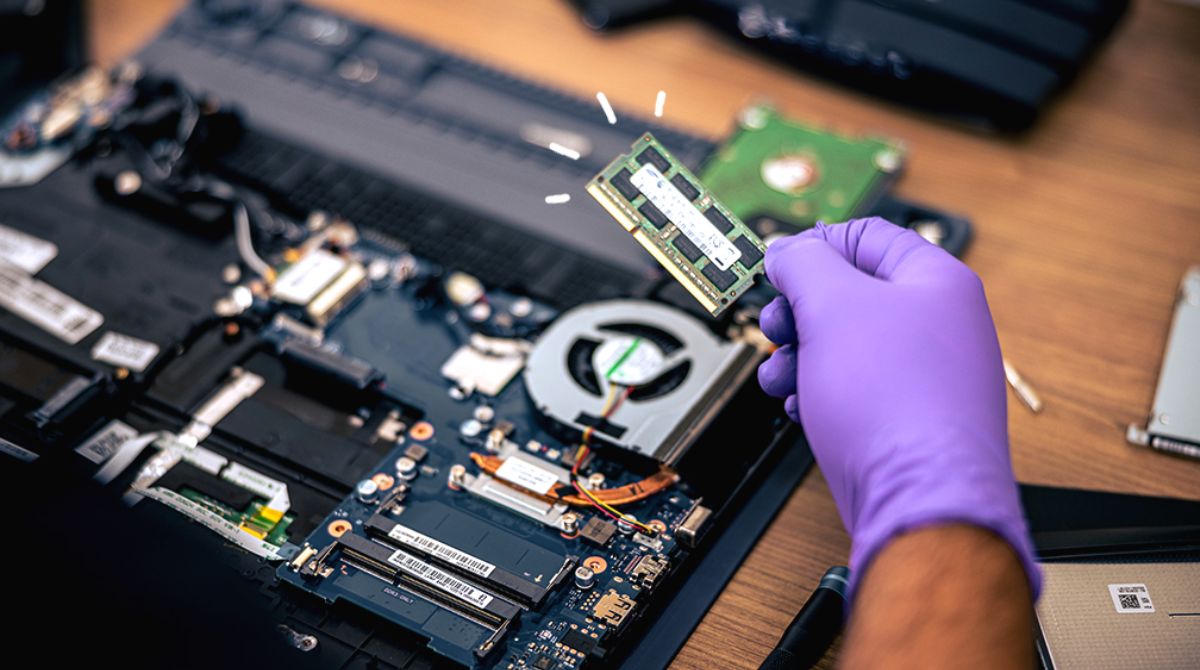Introduction
When it comes to computer memory, ECC RAM is a term that often crops up. But what exactly is ECC RAM and why is it important? In this article, we will delve into the world of ECC RAM, discussing its definition, how it works, its benefits, drawbacks, necessity, and its comparison to non-ECC RAM.
ECC RAM, also known as Error-Correcting Code RAM, is a type of computer memory that is designed to prevent and correct errors that may occur during memory operations. While regular RAM is susceptible to occasional errors, ECC RAM provides an added layer of protection by detecting and correcting these errors automatically.
So, how does ECC RAM achieve this? Let’s explore its inner workings.
ECC RAM utilizes an additional parity bit for each byte of data stored in memory. This parity bit allows the memory controller to verify whether the data has been read or written correctly. If an error is detected, the ECC RAM is capable of automatically correcting single-bit errors, and in some cases, even detecting and alerting the system about multiple-bit errors.
The benefits of ECC RAM are numerous. By mitigating errors in memory operations, ECC RAM helps prevent data corruption, ensuring the accuracy and integrity of stored information. This is particularly crucial in mission-critical systems, such as servers, where even a minor error could have far-reaching consequences.
The added error correction capabilities of ECC RAM also lead to improved system stability and reliability. By identifying and correcting errors on the fly, ECC RAM helps to minimize crashes, freezes, and system failures, providing a smoother and more consistent user experience.
However, there are some drawbacks to consider when using ECC RAM. One major drawback is the potential performance impact. Because ECC RAM requires additional circuitry for error detection and correction, it can lead to a slight decrease in memory performance compared to non-ECC RAM. While this performance impact may not be significant for most users, it can be a deciding factor in high-performance computing scenarios where every bit of speed matters.
So, when is ECC RAM necessary? The need for ECC RAM largely depends on the specific use case and the level of data reliability required. In critical systems that handle sensitive data, such as financial institutions, scientific research facilities, or enterprise servers, the use of ECC RAM is highly recommended to safeguard against errors and ensure data integrity.
Definition of ECC RAM
ECC RAM, short for Error-Correcting Code RAM, is a type of computer memory that incorporates advanced error detection and correction capabilities. Unlike conventional RAM, which is susceptible to occasional errors, ECC RAM provides an additional layer of protection to ensure the integrity and accuracy of stored data. It achieves this by using an algorithm known as error-correcting code to detect and correct errors that may occur during memory operations.
Within ECC RAM, each byte of data is accompanied by an extra bit called a parity bit. This parity bit allows the memory controller to monitor and verify the accuracy of the data stored in memory. Whenever data is read or written, the parity bit is analyzed to determine if any errors exist. If a single-bit error is detected, ECC RAM is capable of automatically correcting it. In cases where multiple-bit errors occur, the ECC RAM can detect these errors and alert the system to take appropriate action.
The error correction capabilities of ECC RAM make it particularly beneficial in critical computing environments that demand high data reliability. By preventing and correcting errors, ECC RAM safeguards against data corruption, which is of utmost importance in applications such as server systems, databases, financial institutions, and scientific research facilities.
It’s important to note that ECC RAM operates on the principle of probabilistic error detection. While it can detect and correct most errors, it may not be foolproof against all types of errors. Nonetheless, ECC RAM significantly reduces the likelihood of data corruption and provides a more robust memory solution compared to standard memory modules.
The use of ECC RAM is not limited to specific computer architectures. It can be implemented in various types of systems, including desktop computers, workstations, servers, and other devices that require a high level of data reliability.
In summary, ECC RAM is a specialized type of computer memory that incorporates error-detection and error-correction capabilities. It helps to prevent and correct errors that may occur during memory operations, ensuring the accuracy and integrity of stored data. While not essential for every computing scenario, ECC RAM is highly recommended in critical systems where data reliability is paramount.
How does ECC RAM work?
ECC RAM, or Error-Correcting Code RAM, utilizes a combination of advanced techniques to detect and correct errors that may occur during memory operations. This additional layer of error correction makes ECC RAM more reliable and robust compared to conventional RAM.
At the heart of ECC RAM’s functionality lies an algorithm known as error-correcting code, which allows it to identify and rectify errors. Let’s explore the key components and processes involved:
1. Parity Bit: ECC RAM adds an extra parity bit to each byte of data stored in memory. This parity bit acts as a checksum, allowing the memory controller to verify the integrity of the data.
2. Error Detection: When data is read or written, the parity bit is examined to determine if any errors have occurred during the memory operation. The ECC algorithm analyzes the data and parity bit to calculate a syndrome, which indicates the presence and location of errors, if any.
3. Single-Bit Error Correction: If a single-bit error is detected, ECC RAM is capable of automatically correcting it. The ECC algorithm uses mathematical calculations to pinpoint and rectify the erroneous bit, ensuring the integrity of the data.
4. Multiple-Bit Error Detection: In cases where multiple-bit errors occur, ECC RAM can detect these errors but cannot correct them. Instead, it triggers an error alert, notifying the system to take appropriate action.
It’s important to note that ECC RAM works in real-time, constantly monitoring the data stored in memory for any potential errors. The error correction process occurs transparently and does not require any user intervention.
The detection and correction capabilities of ECC RAM provide numerous benefits, including enhanced data reliability and integrity. By automatically identifying and rectifying errors, ECC RAM helps prevent data corruption and ensures the accuracy of stored information.
However, it’s worth mentioning that the error correction process employed by ECC RAM does impose a slight performance overhead compared to regular RAM. The additional calculations and checks that occur during memory operations can lead to a minimal reduction in memory speed. While this performance impact is usually negligible for most applications, it can be a consideration in scenarios where every bit of performance is paramount, such as high-performance computing.
In summary, ECC RAM works by incorporating an error-correcting code algorithm and an additional parity bit to detect and correct errors during memory operations. This sophisticated error correction mechanism enhances the reliability and integrity of stored data, making ECC RAM an ideal choice for critical systems that demand high data accuracy and protection against errors.
Benefits of ECC RAM
ECC RAM, or Error-Correcting Code RAM, offers several significant benefits that make it a preferred choice in critical computing environments. Let’s explore the advantages of using ECC RAM:
1. Enhanced Data Reliability: The primary benefit of ECC RAM is its ability to detect and correct errors that may occur during memory operations. By automatically correcting single-bit errors and detecting multiple-bit errors, ECC RAM ensures the integrity and accuracy of stored data. This enhanced data reliability is crucial in mission-critical applications and systems that cannot tolerate data corruption.
2. Improved System Stability: Errors in memory operations can lead to system crashes, freezes, or even data loss. ECC RAM mitigates these issues by identifying and rectifying errors on the fly. This proactive error correction helps improve system stability, providing a smoother and more consistent user experience.
3. Increased System Uptime: The error correction capabilities of ECC RAM also contribute to increased system uptime. By automatically correcting errors, ECC RAM helps reduce the frequency and duration of system crashes and failures. This is particularly crucial in server environments, where uninterrupted service and minimal downtime are essential.
4. Protection against Soft Errors: Soft errors, caused by cosmic radiation or electromagnetic interference, can lead to data corruption or system errors. ECC RAM is designed to detect and correct these soft errors, providing an additional layer of protection against such external influences. This feature is particularly valuable in high-altitude environments, data centers located near industrial equipment, or systems exposed to high levels of electromagnetic radiation.
5. Data Integrity in Critical Applications: ECC RAM is highly beneficial in critical applications that handle sensitive data, such as financial institutions, healthcare systems, or scientific research facilities. The robust error detection and correction capabilities of ECC RAM help ensure the accuracy and reliability of data, minimizing the risk of financial losses, data breaches, or compromised research results.
6. Long-Term Cost Savings: While ECC RAM may come at a higher price compared to non-ECC RAM, its benefits can result in long-term cost savings. By mitigating the risk of data corruption, ECC RAM reduces the need for costly data recovery operations, system repairs, and potential legal ramifications in cases of data loss or inaccuracies. Additionally, the improved system stability and uptime provided by ECC RAM contribute to enhanced productivity and efficiency in critical computing environments.
In summary, ECC RAM offers numerous benefits, including enhanced data reliability, improved system stability, increased system uptime, protection against soft errors, data integrity in critical applications, and potential long-term cost savings. These advantages make ECC RAM an ideal choice for systems and applications that require a high level of data accuracy, protection against errors, and uninterrupted performance.
Drawbacks of ECC RAM
While ECC RAM, or Error-Correcting Code RAM, offers valuable error detection and correction capabilities, it also comes with a few drawbacks to consider. Let’s explore the limitations and potential disadvantages of using ECC RAM:
1. Increased Cost: One significant drawback of ECC RAM is its higher cost compared to non-ECC RAM. The additional circuitry and error correction capabilities of ECC RAM can result in a price premium. This cost difference may not be significant for individual users or non-critical systems, but it can be a consideration for budget-conscious individuals or organizations.
2. Slight Performance Impact: ECC RAM requires additional calculations and checks to monitor and correct errors during memory operations. This additional processing overhead can result in a slight performance impact compared to non-ECC RAM. While this impact is usually negligible for most users and applications, it may be a concern in situations where every ounce of performance matters, such as high-performance computing or gaming systems.
3. Compatibility Limitations: ECC RAM may have compatibility limitations due to its specialized hardware requirements. Not all systems and motherboards support ECC RAM, so it is essential to ensure compatibility before choosing ECC RAM as a memory option. Additionally, ECC RAM is often designed for specific server platforms or workstations, limiting its availability for consumer-grade or niche systems.
4. Limited Error Correction: While ECC RAM can effectively correct single-bit errors, it has limitations when it comes to multiple-bit errors. In cases where multiple-bit errors occur simultaneously, ECC RAM can only detect the errors and provide an alert to the system. It cannot correct these errors automatically, potentially leading to system instability or crashes. However, multiple-bit errors are relatively rare compared to single-bit errors.
5. Potential Interference with Overclocking: Overclocking, the practice of increasing the clock speed of a computer component beyond its default settings, can be impacted by ECC RAM. ECC RAM’s additional error correction processes can interfere with overclocking efforts, reducing the potential for achieving high memory frequencies. If overclocking is a priority, non-ECC RAM may be a more suitable choice.
6. Limited Need for Consumer Applications: For typical consumer applications, such as web browsing, office productivity, or casual gaming, ECC RAM may not be necessary. The error detection and correction capabilities of ECC RAM are most beneficial in critical computing environments that handle vital data or require high system reliability. Therefore, the extra cost and performance impact may not be justified for average consumer use.
In summary, while ECC RAM offers important error detection and correction features, it does have several drawbacks to consider, including the increased cost, slight performance impact, compatibility limitations, limited error correction capabilities for multiple-bit errors, potential interference with overclocking, and limited need for average consumer applications. It’s important to evaluate these factors and assess the specific requirements of your system before deciding whether ECC RAM is the right choice for you.
When is ECC RAM necessary?
ECC RAM, or Error-Correcting Code RAM, is not always necessary for every computer system or user. Its necessity depends on the specific use case and the level of data reliability required. Let’s explore some scenarios where ECC RAM is highly recommended:
1. Mission-Critical Systems: In mission-critical systems that handle sensitive information or perform essential tasks, such as financial institutions, healthcare organizations, or scientific research facilities, the use of ECC RAM is highly recommended. These systems cannot tolerate data corruption or errors, and ECC RAM provides an extra layer of protection to ensure data reliability and integrity.
2. Server Environments: Servers are the backbone of many organizations, delivering critical services and storing vast amounts of data. ECC RAM is crucial in server environments where system stability, uptime, and data accuracy are paramount. By preventing errors and automatically correcting them, ECC RAM helps maintain the integrity of stored data and ensures uninterrupted server operation.
3. Financial and E-commerce Systems: Financial and e-commerce systems process sensitive financial transactions and personal data. Any data corruption or errors can lead to significant financial losses or breaches of privacy. To mitigate these risks, ECC RAM is recommended to provide error detection, correction, and data integrity in these systems.
4. Scientific and Research Computing: Scientific research and computational simulations often involve large datasets and complex calculations. Accurate results are critical, and any error in the data can compromise the validity of the research. ECC RAM plays an important role in maintaining data integrity and ensuring accurate outcomes in scientific and research computing.
5. High-Performance Computing: High-performance computing applications, such as data analysis, simulations, or 3D rendering, may benefit from ECC RAM. While the performance impact of ECC RAM is minimal for most users, those seeking the utmost performance may prefer non-ECC RAM. However, in high-performance computing scenarios where data accuracy and reliability are essential, ECC RAM can provide the necessary proactive error correction capabilities.
6. Long-Term Data Storage: For long-term data storage, such as archives or backup systems, ECC RAM is highly recommended. These storage systems may keep data for prolonged periods, during which errors can occur. ECC RAM reduces the risk of data corruption, ensuring the fidelity of stored information, and safeguarding against the loss or degradation of valuable data over time.
It’s important to note that for typical consumer applications, such as web browsing, office productivity, or casual gaming, ECC RAM may not be necessary. The error detection and correction capabilities of ECC RAM are most valuable in specialized scenarios that demand high data reliability. However, for users who prioritize data integrity or work in critical computing environments, ECC RAM can provide peace of mind and ensure the accuracy and stability of their systems.
ECC RAM vs Non-ECC RAM
When choosing computer memory, one decision to make is whether to opt for ECC RAM or non-ECC RAM. Each type has its own characteristics and suitability for specific use cases. Let’s compare ECC RAM to non-ECC RAM to understand the differences:
1. Error Detection and Correction: The most significant distinction between ECC RAM and non-ECC RAM lies in their error detection and correction capabilities. ECC RAM incorporates additional error correction circuitry and processes to automatically detect and correct errors that occur during memory operations. In contrast, non-ECC RAM lacks this error correction functionality, leaving it more vulnerable to occasional errors without the ability to rectify them.
2. Data Reliability: ECC RAM significantly enhances data reliability by preventing and correcting errors. It ensures the accuracy and integrity of stored information, which is crucial in critical computing environments that handle sensitive data or require high system reliability. Non-ECC RAM, while generally reliable, relies solely on error checking mechanisms and lacks the error correction capabilities of ECC RAM.
3. System Stability: ECC RAM plays a crucial role in improving system stability. By detecting and correcting errors, ECC RAM helps minimize crashes, freezes, and system failures that may result from memory errors. This is especially valuable in mission-critical systems or server environments where system downtime can have severe consequences. Non-ECC RAM, while generally stable, is more susceptible to memory-related issues.
4. Performance Impact: ECC RAM introduces a slight performance impact due to the additional error correction processes it employs. The extra calculations and checks involved in error detection and correction can result in a minimal reduction in memory performance compared to non-ECC RAM. However, this impact is generally negligible for most users and applications. Non-ECC RAM, without the additional error correction overhead, may offer slightly better performance in terms of memory speed.
5. Cost: ECC RAM tends to be more expensive than non-ECC RAM due to its additional circuitry and error correction capabilities. This price difference may be a consideration for budget-conscious individuals or organizations, particularly if the system’s use case does not require the added reliability and error correction features of ECC RAM.
6. Compatibility: ECC RAM has compatibility limitations, as not all systems and motherboards support ECC RAM. It’s important to ensure system compatibility before choosing ECC RAM as a memory option. Non-ECC RAM, on the other hand, has broader compatibility and can be used in a wider range of systems without compatibility concerns.
In summary, ECC RAM offers superior error detection and correction capabilities, enhanced data reliability, improved system stability, and a trade-off of slightly reduced performance and higher cost compared to non-ECC RAM. Non-ECC RAM, while generally reliable and compatible with a wider range of systems, lacks the added error correction functionality. The choice between ECC RAM and non-ECC RAM depends on the specific requirements and priorities of the system, with ECC RAM being more suitable for critical computing environments that demand high data reliability and error correction mechanisms.
Cost of ECC RAM
When considering ECC RAM, one important factor to take into account is the cost. ECC RAM typically comes at a higher price compared to non-ECC RAM. Let’s explore the factors that contribute to the cost of ECC RAM:
1. Specialized Hardware: ECC RAM requires additional circuitry and components to support its error correction capabilities. This specialized hardware adds to the manufacturing and production costs of ECC RAM modules, contributing to its higher price compared to non-ECC RAM.
2. Error Correction Algorithm: ECC RAM incorporates an error correction algorithm that automatically detects and corrects errors during memory operations. The implementation of this algorithm incurs additional research and development costs, which are reflected in the price of ECC RAM modules.
3. Manufacturing Volume: The demand for ECC RAM is generally lower compared to non-ECC RAM, which affects manufacturing volume. The relatively lower volume of ECC RAM production can lead to economies of scale not being achieved, resulting in higher manufacturing costs per unit.
4. Market Demand: The market demand for ECC RAM is primarily driven by specific use cases that prioritize data integrity and reliability. The niche market and specialized requirements of ECC RAM can influence its price point. Increased demand for ECC RAM in critical computing environments may lead to higher prices due to limited supply.
5. Quality and Certification: ECC RAM modules undergo rigorous testing and certification processes to ensure their error correction capabilities meet industry standards. These quality assurance measures add to the manufacturing and testing costs, contributing to the overall price of ECC RAM.
It’s important to note that the cost difference between ECC RAM and non-ECC RAM may not be a significant concern for all users. For individuals or organizations that require the added data reliability and error correction capabilities of ECC RAM, the slightly higher cost may be justified due to the potential risks and consequences associated with data corruption and errors.
However, for users whose computing needs do not necessitate the advanced error correction features and who prioritize budgetary considerations, non-ECC RAM presents a more cost-effective option. Non-ECC RAM generally offers similar performance and compatibility at a lower price point.
In summary, ECC RAM is typically more expensive than non-ECC RAM due to its specialized hardware, error correction algorithm, lower manufacturing volume, market demand, and quality assurance processes. The decision to invest in ECC RAM should be based on the specific requirements of the system and the importance of data reliability and error correction. For critical systems and applications that demand high data integrity, the added cost of ECC RAM may be well worth the investment.
Conclusion
ECC RAM, or Error-Correcting Code RAM, provides a valuable solution for enhancing data reliability and error correction in computer memory. By incorporating advanced error detection and correction capabilities, ECC RAM safeguards against data corruption, improves system stability, and ensures the integrity of stored information. However, it’s essential to consider the specific requirements and priorities of the system before deciding whether to invest in ECC RAM.
In critical computing environments where data integrity is paramount, such as financial institutions, healthcare systems, or scientific research facilities, ECC RAM is highly recommended. Its error correction capabilities reduce the risk of data corruption and provide a higher level of system reliability. Similarly, in server environments, ECC RAM plays a crucial role in maintaining system stability and uptime.
On the other hand, for typical consumer applications, such as web browsing or office productivity, ECC RAM may not be necessary. The added cost and slight performance impact of ECC RAM may not justify the investment for average consumer use.
Ultimately, the decision to choose ECC RAM or non-ECC RAM depends on factors such as the level of data reliability required, the significance of system stability, compatibility with the motherboard, and budget considerations. ECC RAM offers superior error correction capabilities but comes at a higher cost compared to non-ECC RAM. Non-ECC RAM, while lacking the error correction features, may provide a more cost-effective option for users who prioritize budget and do not require advanced error correction.
It’s important to carefully evaluate the specific needs and use cases of the system before making a decision. Whether it’s ECC RAM or non-ECC RAM, selecting the right memory option ensures optimal performance and data integrity for the specific computing requirements. Consider the benefits, drawbacks, compatibility, and cost implications to make an informed choice that aligns with the goals and priorities of your system.











